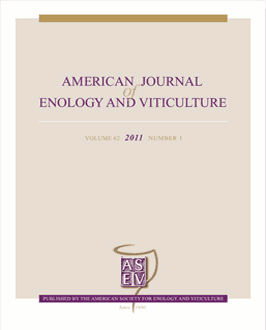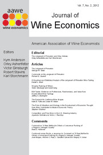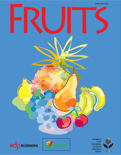
AMERICAN JOURNAL OF ENOLOGY AND VITICULTURE
Scope & Guideline
Pioneering Research in the World of Wine and Grapes.
Introduction
Aims and Scopes
- Viticulture and Grape Production:
Research exploring the cultivation of grapevines, including studies on vine physiology, soil management, and environmental impacts on grape quality and yield. - Enology and Winemaking Techniques:
Investigations into various winemaking processes, including fermentation techniques, chemical analyses, and sensory evaluations of wines. - Pest and Disease Management:
Studies focusing on the identification, prevention, and management of diseases and pests affecting grapevines, including innovative control methods. - Environmental Impact and Sustainability:
Research examining the effects of climate change, sustainable practices, and ecological impacts on vineyards and wine production. - Genetics and Breeding:
Explorations of grapevine genetics, including the development of new cultivars and genetic mapping for disease resistance and other desirable traits. - Chemical Composition and Sensory Analysis:
Analysis of the chemical properties of grapes and wines, and how these affect flavor profiles, aroma, and overall quality.
Trending and Emerging
- Climate Change Adaptation:
An increasing number of studies focus on the impacts of climate change on grape production and strategies for adaptation, highlighting the urgent need for research in this area. - Genetic Resistance to Diseases:
There is a growing emphasis on the genetic mapping and breeding of grapevines for disease resistance, particularly against pathogens like Grapevine Red Blotch Virus. - Precision Agriculture Technologies:
Emerging research on precision viticulture technologies, including remote sensing and data analytics, reflects the trend towards optimizing vineyard management. - Innovative Fermentation Techniques:
Studies exploring the use of non-Saccharomyces yeast and novel fermentation methods are gaining traction, indicating a shift towards enhancing wine quality through technological advancements. - Environmental Sustainability Practices:
Research increasingly addresses sustainable practices in viticulture, including water management and organic farming, in response to both consumer demand and environmental regulations.
Declining or Waning
- Traditional Pest Control Methods:
Research on conventional pest control strategies appears to be decreasing, likely due to the growing emphasis on integrated pest management and sustainable practices. - Historical Winemaking Techniques:
There has been a noticeable reduction in studies focusing solely on traditional winemaking practices, as contemporary research prioritizes innovative and experimental methods. - Generalized Soil Management Practices:
Papers dealing with broad soil management techniques are becoming less frequent, indicating a shift towards more specialized or innovative practices tailored to specific conditions.
Similar Journals

Pesquisa Agropecuaria Tropical
Empowering innovation in agronomy and crop science.pesquisa Agropecuaria Tropical is a premier Open Access journal dedicated to advancing the knowledge and practices within the field of agronomy and crop science. Since its inception in 1971, this peer-reviewed journal, published by the Universidade Federal de Goiás, has played a pivotal role in disseminating high-quality research from Brazil and beyond. Operating under an Open Access model, it ensures that scholarly articles are freely accessible, thereby fostering greater collaboration and innovation. With a Scopus ranking placing it in the 32nd percentile among its peers in agricultural and biological sciences, and a current classification in the Q3 category of agronomy and crop science, the journal serves as an essential resource for researchers, professionals, and students alike. As it continues its publication journey from 2010 to 2024, it remains committed to contributing valuable insights and advancements in the agricultural sector, ultimately influencing sustainable practices and food security.

Agricultural Science and Practice
Elevating agricultural science through peer-reviewed excellence.Agricultural Science and Practice is a pivotal journal dedicated to advancing knowledge and research in the field of agricultural sciences. Published by the NATIONAL ACADEMY OF AGRARIAN SCIENCES OF UKRAINE, this journal serves as a vital resource for researchers, professionals, and students engaged in agriculture, agronomy, and related disciplines. The journal aims to disseminate high-quality, peer-reviewed articles that address contemporary issues, innovative practices, and advancements in agricultural methodologies. While currently specified as non-open access, the journal endeavors to contribute significantly to the global agricultural knowledge pool while fostering a collaborative research environment. With its base in Kyiv, Ukraine, Agricultural Science and Practice plays an essential role in highlighting regional agricultural challenges and solutions, thereby attracting a diverse readership that aspires to enhance food security and sustainable farming practices worldwide.

Romanian Agricultural Research
Empowering Researchers to Transform Agricultural PracticesRomanian Agricultural Research is a prominent academic journal dedicated to advancing the field of agricultural science with a specific focus on agronomy and crop management. Published by the NATL AGRICULTURAL RESEARCH & DEVELOPMENT INST in Romania, this journal has established itself as an important resource within its discipline, evidenced by its Q3 ranking in the Agronomy and Crop Science category for 2023. With its ongoing publication since 2008, the journal provides a platform for researchers and professionals to disseminate their findings and share innovative practices that address the challenges faced in agricultural development. Although it operates under a non-open access model, Romanian Agricultural Research commits to rigorous peer-review processes, ensuring the high-quality content that enhances the academic community’s knowledge base. The journal's objective is to foster dialogues surrounding sustainable agriculture, improve crop yield, and contribute to the enhancement of agricultural practices globally. Researchers, professionals, and students will find this journal to be an invaluable repository of knowledge and a catalyst for future agricultural innovations.

Ciencia e Tecnica Vitivinicola
Unveiling the Secrets of Wine: A Gateway to Scientific DiscoveryCiencia e Tecnica Vitivinicola is a premier open-access journal dedicated to the fields of Food Science and Horticulture, published by ESTACAO VITIVINICOLA NACIONAL in Portugal. Since its inception in 2008, this journal has provided a vital platform for researchers, professionals, and students focused on advancing the scientific study of viticulture and wine technology. With a significant commitment to open access since 2014, Ciencia e Tecnica Vitivinicola encourages widespread dissemination of knowledge, thus enhancing collaboration across the global scientific community. In 2023, it achieved a commendable ranking within the Q3 and Q2 quartiles for Food Science and Horticulture, respectively, demonstrating its impact and relevance in the academic landscape. Furthermore, with Scopus ranking it at 45 out of 115 in Horticulture and 208 out of 389 in Food Science, the journal continues to uphold high standards of scholarly excellence. With its scope encompassing innovative research, technological advancements, and practical applications in viticulture, Ciencia e Tecnica Vitivinicola is an indispensable resource for those passionate about the future of wine production and horticultural practices.

Revista Caatinga
Cultivating Knowledge, Harvesting ProgressRevista Caatinga is a premier open-access journal published by Universidade Federal Rural do Semi-Árido (UFERSA), dedicated to the dissemination of significant research within the field of Agricultural and Biological Sciences. Since its inception in 2006, the journal has aimed to bridge the knowledge gap in various aspects of agricultural practices and biological phenomena, making vital contributions to the scientific community. With its publications indexed in Scopus and holding an impressive Q2 categorization in the competitive landscape of agricultural sciences, the journal ranks within the top half of its category (100/221), demonstrating a commitment to quality scholarship. The journal is based in Brazil and covers a wide array of topics relevant to both local and global agricultural challenges. By fostering open access, Revista Caatinga ensures that vital research is available to a broad audience, promoting knowledge sharing and collaboration among researchers, practitioners, and students around the world.

Journal of Wine Economics
Innovating Research at the Intersection of Wine and EconomicsJournal of Wine Economics, published by Cambridge University Press, is a leading interdisciplinary journal dedicated to advancing the understanding of the economics of wine through rigorous research and analysis. With an ISSN of 1931-4361 and E-ISSN 1931-437X, this journal plays a crucial role in the intersection of economics, business, and food science, offering insights relevant to both academia and industry. The journal has garnered recognition, achieving a Q2 ranking in the categories of Business, Management, and Accounting, Food Science, and Horticulture, as reflected in its Scopus rankings, with significant placement in the percentile rankings within these fields. As of 2023, it continues to contribute to the online discourse on wine economics while fostering a collaborative environment for researchers, professionals, and students interested in the intricacies of this vibrant sector. Although it does not currently provide open access options, readers can engage with its valuable content through academic libraries and institutional subscriptions, making it an essential resource for those seeking to deepen their expertise in wine economics.

Scientific Papers-Series B-Horticulture
Exploring Innovations in Horticulture and Sustainable Agriculture.Scientific Papers-Series B-Horticulture is a distinguished open-access journal published by the University of Agronomic Sciences and Veterinary Medicine Bucharest. With its ISSN 2285-5653 and E-ISSN 2286-1580, this journal has been accessible to the global research community since 2002, ensuring that vital horticultural research reaches a wide audience without barriers. Positioned at the forefront of the horticultural sciences, the journal serves as a platform for original research, reviews, and innovations pertaining to horticultural practices, plant physiology, and sustainable agriculture. Its contributions are not just significant in Romania but also resonate through the international scientific community, helping to address pressing agricultural challenges. The office located at 59 Marasti Boulevard, District 1, Bucharest 011464, Romania, symbolizes its commitment to advancing horticultural knowledge and fostering collaboration among researchers, professionals, and students alike. With no current H-index data, the journal invites continued contributions to enhance its visibility and impact in the field.

Fruits
Unveiling the Secrets of Fruit Science for Tomorrow's Harvest.Fruits, published by the International Society for Horticultural Science (ISHS), is a pivotal journal in the fields of Agronomy, Food Science, and Horticulture. Since its inception in 1995 and with a continued publication from 2001 to 2024, this journal provides a platform for innovative research and advancements related to fruit science, covering an array of topics from cultivation techniques to post-harvest processing. With an ISSN number of 0248-1294 and an E-ISSN of 1625-967X, *Fruits* engages a global audience, operating out of France and serving as a vital resource for academics, industry professionals, and students alike. Despite its current categorization as Q4 in Agronomy and Crop Science and Q3 in both Food Science and Horticulture, the journal is committed to fostering high-quality research and enhancing its visibility within the academia, as reflected in its Scopus rankings. Readers can expect rigorous peer-reviewed articles that contribute significantly to the understanding of fruit-related science, ultimately driving the advancement of sustainable practices in the field. Emphasizing accessibility, while currently not open access, *Fruits* remains dedicated to disseminating valuable knowledge to enhance the communal pursuit of excellence in horticultural research.

POTATO RESEARCH
Uncovering the potential of the humble potato.POTATO RESEARCH is a prestigious journal dedicated to advancing the scientific understanding of potato cultivation and its wider implications in the fields of agronomy, crop science, and food science. Published by Springer in the Netherlands, this journal boasts an impressive impact factor and ranks in the Q2 category for both Agronomy and Crop Science, as well as Food Science in 2023, affirming its significant contribution to these disciplines. With over five decades of research converged from 1970 to 2024, POTATO RESEARCH serves as a vital platform for researchers, professionals, and students interested in the latest findings and innovations that affect potato production and processing. Although it is not an open-access journal, it remains a crucial resource for those dedicated to enhancing agricultural sustainability and food security. For inquiries or submission details, please refer to their office located at Van Godewijckstraat 30, 3311 GZ Dordrecht, Netherlands.

PLANT PROTECTION SCIENCE
Unlocking the potential of agronomy for environmental preservation.PLANT PROTECTION SCIENCE, published by the Czech Academy Agricultural Sciences, is an esteemed journal dedicated to advancing the field of agronomy, crop science, and soil science. With a strong open access policy since 2007, this journal has made significant contributions to the dissemination of research relevant to plant protection, sustainable agriculture, and environmental preservation. Operating from Prague, Czech Republic, it has successfully positioned itself within the Q2 category in Agronomy and Crop Science and Q3 in Soil Science as of 2023, highlighting its relevance and influence in these vital areas of agricultural research. According to Scopus, its rankings reflect a respectable standing, with percentile ranks of 58th in Agronomy and Crop Science and 53rd in Soil Science. Researchers, professionals, and students are encouraged to explore its rich repository of peer-reviewed articles, which aim to address critical challenges in plant health and production, thereby fostering innovation in agricultural practices.